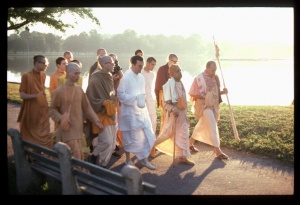SB 1.13.16: Difference between revisions
m (1 revision(s)) |
(Vanibot #0020: VersionCompareLinker - added a link to the Version Compare feature) |
||
| Line 1: | Line 1: | ||
{{info | {{info | ||
|speaker= | |speaker=Sūta Gosvāmī | ||
|listener=Sages of | |listener=Sages of Naimiṣāraṇya | ||
}} | }} | ||
[[Category:Srimad-Bhagavatam - Canto 01 Chapter 13]] | |||
[[Category:Bhagavatam Verses Spoken by Suta Gosvami - Vanisource|011316]] | |||
<div style="float:left">'''[[Srimad-Bhagavatam]] - [[SB 1|First Canto]] - [[SB 1.13: Dhrtarastra Quits Home|Chapter 13: Dhṛtarāṣṭra Quits Home]]'''</div> | |||
<div style="float:right">[[File:Go-previous.png|link=SB 1.13.15]] '''[[SB 1.13.15]] - [[SB 1.13.17]]''' [[File:Go-next.png|link=SB 1.13.17]]</div> | |||
{{CompareVersions|SB|1.13.16|SB 1965|SB 1972-77}} | |||
{{RandomImage}} | |||
==== TEXT 16 ==== | ==== TEXT 16 ==== | ||
<div class="verse"> | |||
<div | :yudhiṣṭhiro labdha-rājyo | ||
yudhiṣṭhiro labdha-rājyo | :dṛṣṭvā pautraṁ kulan-dharam | ||
dṛṣṭvā pautraṁ kulan-dharam | :bhrātṛbhir loka-pālābhair | ||
bhrātṛbhir loka-pālābhair | :mumude parayā śriyā | ||
mumude parayā śriyā | |||
</div> | </div> | ||
| Line 18: | Line 23: | ||
==== SYNONYMS ==== | ==== SYNONYMS ==== | ||
<div class="synonyms"> | |||
<div | ''yudhiṣṭhiraḥ''—Yudhiṣṭhira; ''labdha-rājyaḥ''—possessing his paternal kingdom; ''dṛṣṭvā''—by seeing; ''pautram''—the grandson; ''kulam-dharam''—just suitable for the dynasty; ''bhrātṛbhiḥ''—by the brothers; ''loka-pālābhaiḥ''—who were all expert administrators; ''mumude''—enjoyed life; ''parayā''—uncommon; ''śriyā''—opulence. | ||
</div> | </div> | ||
| Line 26: | Line 30: | ||
==== TRANSLATION ==== | ==== TRANSLATION ==== | ||
<div class="translation"> | |||
<div | |||
Having won his kingdom and observed the birth of one grandson competent to continue the noble tradition of his family, Mahārāja Yudhiṣṭhira reigned peacefully and enjoyed uncommon opulence in cooperation with his younger brothers, who were all expert administrators to the common people. | Having won his kingdom and observed the birth of one grandson competent to continue the noble tradition of his family, Mahārāja Yudhiṣṭhira reigned peacefully and enjoyed uncommon opulence in cooperation with his younger brothers, who were all expert administrators to the common people. | ||
</div> | </div> | ||
| Line 34: | Line 37: | ||
==== PURPORT ==== | ==== PURPORT ==== | ||
<div class="purport"> | |||
<div | |||
Both Mahārāja Yudhiṣṭhira and Arjuna were unhappy from the beginning of the Battle of Kurukṣetra, but even though they were unwilling to kill their own men in the fight, it had to be done as a matter of duty, for it was planned by the supreme will of Lord Śrī Kṛṣṇa. After the battle, Mahārāja Yudhiṣṭhira was unhappy over such mass killings. Practically there was none to continue the Kuru dynasty after them, the Pāṇḍavas. The only remaining hope was the child in the womb of his daughter-in-law, Uttarā, and he was also attacked by Aśvatthāmā, but by the grace of the Lord the child was saved. So after the settlement of all disturbing conditions and reestablishment of the peaceful order of the state, and after seeing the surviving child, Parīkṣit, well satisfied, Mahārāja Yudhiṣṭhira felt some relief as a human being, although he had very little attraction for material happiness, which is always illusory and temporary. | Both Mahārāja Yudhiṣṭhira and Arjuna were unhappy from the beginning of the Battle of Kurukṣetra, but even though they were unwilling to kill their own men in the fight, it had to be done as a matter of duty, for it was planned by the supreme will of Lord Śrī Kṛṣṇa. After the battle, Mahārāja Yudhiṣṭhira was unhappy over such mass killings. Practically there was none to continue the Kuru dynasty after them, the Pāṇḍavas. The only remaining hope was the child in the womb of his daughter-in-law, Uttarā, and he was also attacked by Aśvatthāmā, but by the grace of the Lord the child was saved. So after the settlement of all disturbing conditions and reestablishment of the peaceful order of the state, and after seeing the surviving child, Parīkṣit, well satisfied, Mahārāja Yudhiṣṭhira felt some relief as a human being, although he had very little attraction for material happiness, which is always illusory and temporary. | ||
</div> | </div> | ||
__NOTOC__ | |||
<div style="float:right; clear:both;">[[File:Go-previous.png|link=SB 1.13.15]] '''[[SB 1.13.15]] - [[SB 1.13.17]]''' [[File:Go-next.png|link=SB 1.13.17]]</div> | |||
__NOTOC__ | |||
__NOEDITSECTION__ | |||
Revision as of 09:00, 25 May 2020

A.C. Bhaktivedanta Swami Prabhupada
TEXT 16
- yudhiṣṭhiro labdha-rājyo
- dṛṣṭvā pautraṁ kulan-dharam
- bhrātṛbhir loka-pālābhair
- mumude parayā śriyā
SYNONYMS
yudhiṣṭhiraḥ—Yudhiṣṭhira; labdha-rājyaḥ—possessing his paternal kingdom; dṛṣṭvā—by seeing; pautram—the grandson; kulam-dharam—just suitable for the dynasty; bhrātṛbhiḥ—by the brothers; loka-pālābhaiḥ—who were all expert administrators; mumude—enjoyed life; parayā—uncommon; śriyā—opulence.
TRANSLATION
Having won his kingdom and observed the birth of one grandson competent to continue the noble tradition of his family, Mahārāja Yudhiṣṭhira reigned peacefully and enjoyed uncommon opulence in cooperation with his younger brothers, who were all expert administrators to the common people.
PURPORT
Both Mahārāja Yudhiṣṭhira and Arjuna were unhappy from the beginning of the Battle of Kurukṣetra, but even though they were unwilling to kill their own men in the fight, it had to be done as a matter of duty, for it was planned by the supreme will of Lord Śrī Kṛṣṇa. After the battle, Mahārāja Yudhiṣṭhira was unhappy over such mass killings. Practically there was none to continue the Kuru dynasty after them, the Pāṇḍavas. The only remaining hope was the child in the womb of his daughter-in-law, Uttarā, and he was also attacked by Aśvatthāmā, but by the grace of the Lord the child was saved. So after the settlement of all disturbing conditions and reestablishment of the peaceful order of the state, and after seeing the surviving child, Parīkṣit, well satisfied, Mahārāja Yudhiṣṭhira felt some relief as a human being, although he had very little attraction for material happiness, which is always illusory and temporary.